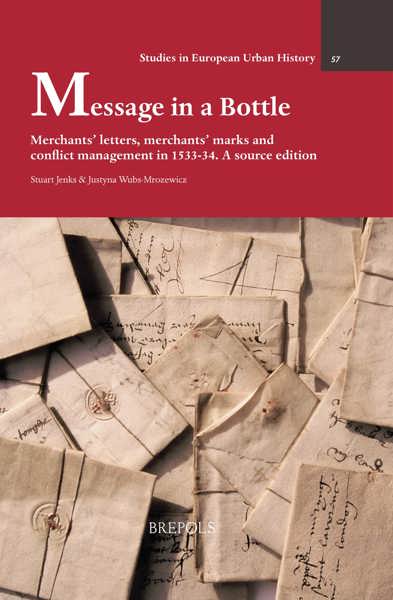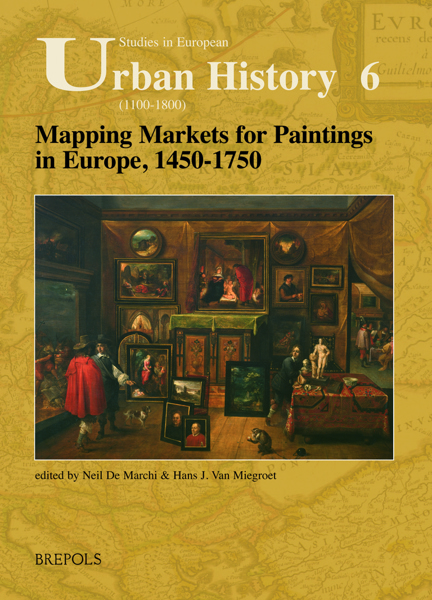
Message in a Bottle
Merchants' letters, merchants' marks and conflict management in 1533-34. A source edition
Stuart Jenks, Justyna Wubs-Mrozewicz (eds)
- Pages: 257 p.
- Size:178 x 254 mm
- Illustrations:15 b/w, 7 tables b/w., 2 maps b/w
- Language(s):English
- Publication Year:2022
- € 86,00 EXCL. VAT RETAIL PRICE
- ISBN: 978-2-503-59540-5
- Hardback
- Available
- ISBN: 978-2-503-59541-2
- E-book
- Available
The serendipitous discovery of unique and unopened English and Dutch letters from 1533, as well as a set of administrative documents shedding light on why they were never delivered, offers new openings into the study of economic, political, and social history of premodern northern Europe.
"Stuart Jenks und Justyna Wubs-Mrozewicz, beide mit ausgewiesener Expertise zur Hansegeschichte und den entsprechenden Fragestellungen, haben sich der höchst verdienstvollen Aufgabe angenommen, ein unbekanntes und ungenutztes Bündel von merkantilen Korrespondenzen gewissenhaft zu edieren und anschaulich einzuführen." (Heinrich Lang, in SEHEPUNKTE, 24/2, 2024)
Stuart Jenks, Ph.D. (1976), Yale University, Dr. phil. habil. (1985), Free University of Berlin, is an emeritus professor of medieval history and medieval and modern economic history at the University of Erlangen. He has edited and published extensively on these areas.
Justyna Wubs-Mrozewicz, Ph.D. (2008) is associate professor of medieval history at the University of Amsterdam. She is currently the PI of the NWO VIDI research project on premodern conflict management and has published on social, economic, political and cultural history of northern Europe, as well as on the intersection of history and social sciences in the topics of trust and conflict management.
In 1533, a batch of merchants’ letters was to be delivered from Antwerp to London. They never reached their destination, and were only opened in a Hanseatic archive almost 500 years later. Like a message in a bottle, the letters unfold unknown individual stories and large-scale drama. They offer a fascinating glimpse into the world of the early 16th century, from hard-nosed business and prices in code sent to a wife, to the fond greetings of an English father to his three young sons or a secretive message of a grandmother from Antwerp. At the backdrop, war was looming: the letters were part of a booty taken in the English Channel in August of 1533. Lübeck privateers plundered six neutral ships, carting the goods of English, Dutch, Spanish, Venetian and Hanseatic merchants off to Lübeck and Hamburg. As a result, Henry VIII of England exploded with rage and restitution claims were made. Soon after, Lübeck realized the potential political cost of the action and an administrative machinery for the return of the booty was set in motion. Extensive documentation was produced under the eye of notaries, providing an overview of properties of the involved parties, including many merchant marks.
The combination of unique letters and administrative documents offers new openings into the study of economic, political and social history of pre-modern northern Europe. Highlights are the migration of people and goods, resourceful conflict management and the voice of ordinary people, captured in their letters.
1. Introduction (I) by Stuart Jenks: serendipitous source find and source highlights; large-scale political context of 1533 from the English and Hanseatic point of view; English letters (holographs: business and private matters); documentation on the recovery of the cargo; English, Hanseatic, Venetian, Dutch, Spanish losses (goods)
2. Introduction (II) by Justyna Wubs-Mrozewicz: large-scale political context from the point of view of the Low Countries (and Spain); the position of Antwerp as metropolis [NB the discovered correspondence was between Antwerp and London]; the letters in Dutch ((holographs: business and private matters; uniquely: women writing); merchants’ marks and the pilot database
3. Notes on the edition of the text (both editors)
4. Bibliography
Source edition
5. Merchants’ letters (English and Dutch)
6. Capture of the ship of Adrian Johnson (Antwerp) 19.08.1533 (depositions in Low German, Latin)
7. English losses in the ship of Adrian Johnson (in English, Low German)
8. Goods taken from Venetian merchants in the ship of Adrian Johnson (Latin)
9. Hanseatic losses in the ship of Adrian Johnson (Low German)
10. Goods taken in the Spanish ships (Latin, Low German)
11. Goods taken from ships of the Low Countries (Latin, Low German)
[thumbnails of merchants’ marks with annotation of occurrence in text]
12. Index




